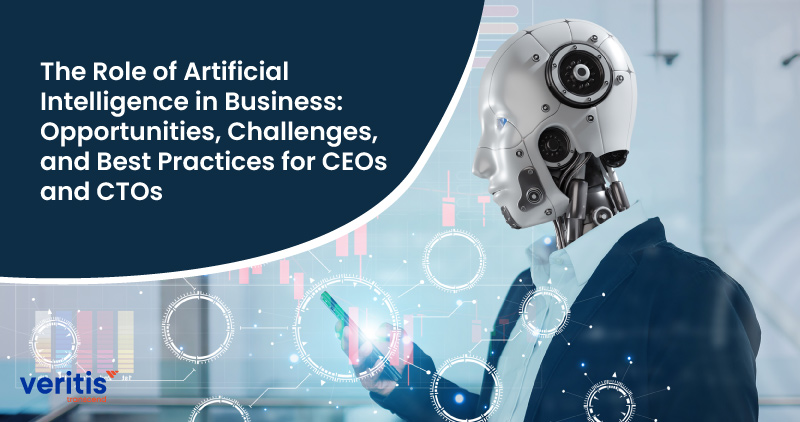
The fast pace of technological advancement emphasizes the need for organizations to utilize innovative technology to outperform competitors. Chief Technology Officers (CTOs) are crucial in this role. With their deep understanding of the constantly evolving technology landscape, CTOs can help companies identify new opportunities for innovation and growth.
CTOs are essential in shaping an organization’s technology strategy and ensuring a competitive edge. They stay updated on emerging trends and innovations, identifying disruptive technologies that can be utilized. For instance, artificial intelligence (AI) and machine learning (ML) transform business operations, providing CTOs with a competitive advantage when effectively utilized.
According to the IBM survey, IT professionals identified the shifting demands of companies following the pandemic as a critical reason for embracing AI in their organizations. 43% of respondents accelerated AI implementation in their companies due to the pandemic’s impact.
AI is becoming essential in the evolving business landscape as technology advances. AI revolutionizes operations, efficiency, and growth across customer service and supply chain management. However, adopting AI also presents challenges that CEOs and CTOs must navigate.
Let us explore AI’s role in business, challenges, use cases, and best practices for CEOs/CTOs to maximize benefits.
What Is Artificial Intelligence (AI) in Business?
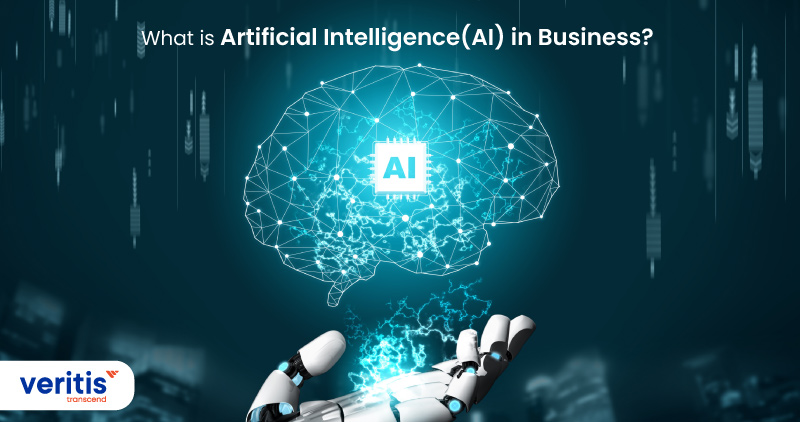
Companies must Adapt strategies, leverage data, and navigate customer preferences for growth. As a result, revise traditional approaches to address challenges. However, AI offers new growth opportunities by utilizing customer data insights. As a result, artificial intelligence in business boosts revenue, enhances customer experience, and drives growth and efficiency through intelligent software.
Evolving customer preferences and data complexity challenge traditional growth methods. AI unlocks actionable insights from customer data, automates processes, and fosters unparalleled customer understanding and engagement. As a result, adopting AI for businesses is crucial to thrive and maintain relevance in today’s fiercely competitive market.
AI Applications in Business
AI finds application in various aspects of business, including:
- Customer service
- Business intelligence
- Targeted marketing
- Product recommendation and predictive analytics
- Natural language processing
Applications of artificial intelligence offer wide-ranging benefits for companies, including automation, enhanced customer experience, increased revenue, and improved security.
Do Companies Need to Use AI?
Labor-intensive and inefficient human functions mark the complexity of modern artificial intelligence business operations. Data has become the driving force in the twenty-first century in AI for business. Data can offer companies valuable insights and tactics that can significantly accelerate growth.
Being proactive is crucial in today’s highly competitive artificial intelligence business landscape. Companies must understand their clients’ demands and preferences to succeed and stay relevant.
Artificial intelligence software has become a potent tool with the potential to change the way companies operate. It presents a plethora of potential artificial intelligence for companies to improve customer experience, optimize operations, and spur growth as it develops.
Useful link: How AI Adoption Will Transform Your Business
Opportunities and Applications of Artificial Intelligence in Business
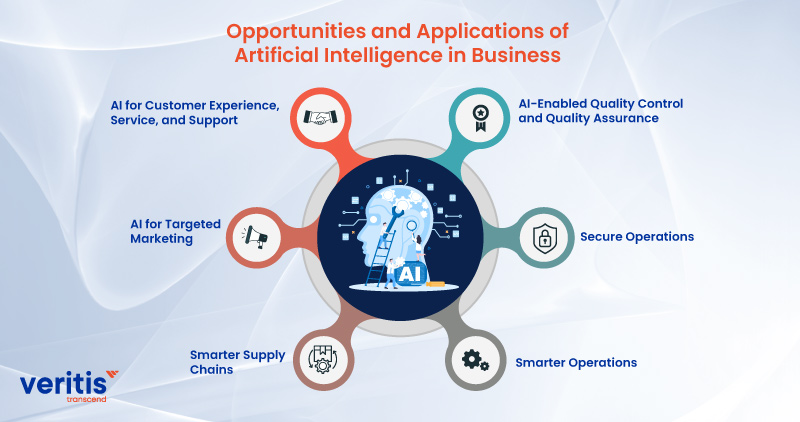
1) AI for Customer Experience, Service, and Support
Customer experience, service, and support are highly sought-after domains for implementing artificial intelligence (AI) within organizations. For instance, chatbots employ NLP (natural language processing) and machine learning algorithms to comprehend client demands and respond appropriately. Likewise, AI-powered recommendation systems utilize customer information and predictive analytics to suggest desired goods. Moreover, intelligent systems can guide employees in providing clients with better service by making recommendations based on analytics.
2) AI for Targeted Marketing
A lot of marketing campaigns, both online and offline, leverage AI to provide personalized messages. AI analyzes user preferences and behavior to optimize ad placements and click-through rates. AI fuses facial recognition, geolocation, and individual preferences for personalized customer advertising.
3) Smarter Supply Chains
Many companies leverage artificial intelligence (AI) to optimize and elevate their supply chain management processes. For instance, machine learning algorithms estimate consumer demand, optimize inventory and determine optimal supply shifts. This can assist companies in developing supply chains that are more effective and economical.
4) Smarter Operations
AI-enabled capabilities are being integrated into business process apps, making AI more pervasive in the enterprise. Various processes, like call routing for customers, inventory tracking, and threat detection, can be automated with this.
5) Secure Operations
Several companies are utilizing AI to increase security. AI analyzes endpoint device data to uncover problematic behaviors, hazardous situations, and business possibilities. It then takes proactive measures to prevent or correct them, enhancing operational safety and unlocking new opportunities.
6) AI-Enabled Quality Control and Quality Assurance
Manufacturers are utilizing AI-powered machine vision and deep learning to increase the efficiency and precision of their quality control processes while reducing costs.
Useful link: All You Need to Know about Artificial Intelligence as a Service (AIaaS)
Challenges of Implementing Artificial Intelligence in Business
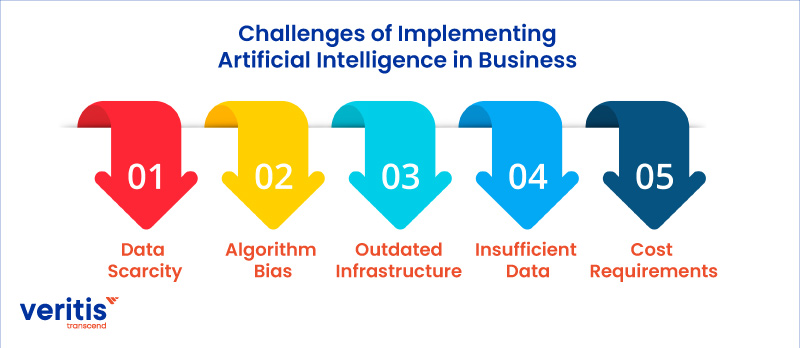
Despite the potential benefits and growing adoption of artificial intelligence for business, several challenges must be addressed for successful implementation.
1) Data Scarcity
One of the primary challenges that companies face in implementing AI is data scarcity. Large volumes of data are needed for training in applications of artificial intelligence, particularly those using machine learning. The usage of AI might be restricted in circumstances when there is a lack of enough data. The availability of a large amount of unstructured and unlabeled data presents further obstacles to adopting AI.
2) Algorithm Bias
Another challenge in implementing AI is algorithm bias, which can occur when AI systems are trained on partial data. This can lead to applications of artificial intelligence that perpetuate existing biases and produce unfair outcomes. Therefore, addressing algorithm bias is crucial for ensuring AI systems operate pretty and ethically.
3) Outdated Infrastructure
Companies seeking effective AI implementation must invest in advanced infrastructure, tools, and applications to rapidly process large amounts of data. Proactive technological investment revolutionizes learning and development with machine learning.
4) Insufficient Data
Inaccurate AI outcomes arise from insufficient or biased data. Ensure the use of representative, high-quality data to prevent this issue. Start with simpler algorithms to facilitate understanding, bias control, and necessary artificial intelligence modifications for business journeys. It is crucial to address the bias problem by using appropriate data and algorithmic choices.
5) Cost Requirements
Developing and integrating AI into your training strategy can be costly. Collaboration with AI experts, implementing ongoing training programs, and updating IT equipment are necessary expenses. Minimize costs by exploring budget-friendly training programs and free artificial intelligence applications. Consider identifying the AI capabilities your training program needs before investing in them.
Best Practices for CEOs and CTOs
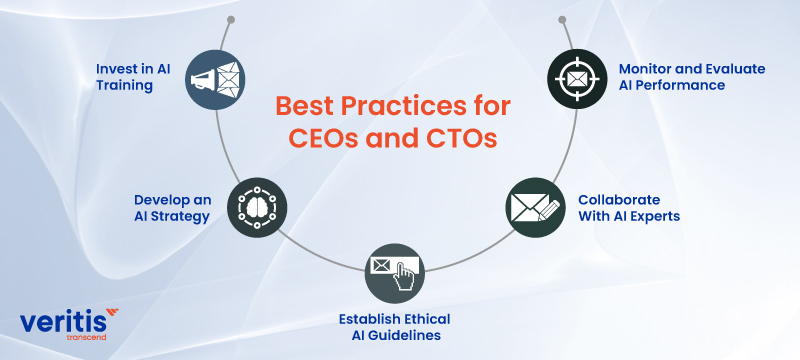
CEOs and CTOs should embrace the following best practices to maximize the advantages of AI and solve the challenges:
1) Invest in AI Training
Business owners must spend money on providing their staff with AI training. As a result, it will create a workforce equipped with the necessary abilities and information. In addition, AI training empowers staff to understand AI’s benefits and risks, enabling wise decisions and effective implementation in organizations.
2) Develop an AI Strategy
Companies that want to deploy AI successfully must have a comprehensive AI strategy. Outline objectives, specific artificial intelligence applications, and required infrastructure/resources for effective AI implementation. Develop a clear AI strategy to ensure goal alignment and proper utilization of AI technologies.
3) Establish Ethical AI Guidelines
CEOs and CTOs must establish ethical rules to ensure responsible development and use of artificial intelligence applications. These recommendations should cover algorithm bias, data security, and privacy. Companies may reduce the hazards posed by AI and increase consumer and employee trust by developing ethical AI rules.
4) Collaborate With AI Experts
Working with AI professionals can benefit firms trying to adopt AI effectively. Leverage AI specialists for valuable insights, advice, and informed decision-making. CEOs and CTOs can make sure they team up with AI specialists to navigate the complexities of AI and ensure organizational readiness.
5) Monitor and Evaluate AI Performance
Regular monitoring and evaluation ensure AI projects deliver the expected results. Companies can monitor AI performance to pinpoint areas for improvement and make any necessary changes to their AI strategy. Maximize AI implementation benefits through proactive performance monitoring.
Useful link: AI-Powered, ML-Driven – The New DevOps Trend!
Industry-Specific AI Use Cases
1. Healthcare
A) AI-Enabled Data Analysis and Diagnoses
AI systems analyze vast volumes of patient data, including medical records, lab findings, and imaging scans, to identify trends and provide accurate diagnoses.
B) Personalized Treatment Planning
AI algorithms utilize patient data, including genetic information and treatment history, to create personalized treatment regimens tailored to specific illnesses and patient needs.
C) AI-Assisted Drug Discovery and Development
AI expedites drug discovery by analyzing extensive biological and chemical data, facilitating the identification of promising drug candidates, and optimizing the development process.
2. Financial Services
A) Fraud Detection Using AI
AI algorithms analyze transactional data, detect suspicious patterns, and flag potential fraud cases, aiding in identifying fraudulent activities and facilitating further investigation.
B) AI-Powered Risk Assessment and Wealth Management
AI-powered tools evaluate investment risks, offer personalized financial advice, and develop wealth management strategies aligned with individual goals and risk tolerance.
C) AI-Driven Trading and Market Analysis
AI algorithms analyze market data, news articles, and social media sentiments to identify trends, facilitate informed trading decisions, and offer investment strategy insights.
3. Industrial Maintenance
A) Predictive Maintenance Through AI
AI systems monitor and analyze data from industrial machinery to predict malfunctions, plan proactive maintenance, and minimize downtimes.
B) Efficiency Optimization With AI
In increasing productivity, AI algorithms aid in scrutinizing production data, spotting bottlenecks, and optimizing manufacturing processes, which results in enhanced efficiency and reduced waste.
4. Transportation
A) Self-Driving Vehicles Powered by AI
The role of AI in autonomous vehicles cannot be overstated, as it enables them to effectively perceive and interpret their surroundings, make informed driving decisions, and significantly enhance road safety.
B) AI-Driven Traffic Management
AI algorithms can enhance traffic flow, reduce congestion, and improve transportation efficiency by analyzing real-time traffic data from multiple sources, such as sensors and cameras.
C) Logistics Optimization Through AI
The optimization of route planning, load balancing, and supply chain management can be achieved using AI, which results in more efficient delivery schedules, reduced costs, and enhanced customer satisfaction.
5. Retail
A) Personalized Customer Experiences Powered by AI
Artificial intelligence software systems can examine client information, such as purchase history and preferences, to offer specialized product recommendations and customized shopping experiences.
B) AI-Based Inventory Management
AI systems can analyze sales data, demand trends, and outside influences to optimize stock levels, eliminate stockouts, and lower carrying costs.
C) Price Optimization Using AI
AI-powered pricing systems may analyze market dynamics, rival pricing, and customer behavior to improve price strategies, increase sales, and maximize profitability.
These instances show how AI is being applied in particular sectors, and as technology develops, the variety of potential applications of artificial intelligence grows.
Useful link: AI Reshaping Future of Data Center Industry – Google Shows How?
Final Thoughts
Companies have the potential to boost revenue, increase productivity, and improve consumer experiences thanks to artificial intelligence software. First, however, solving issues including data shortage, algorithm bias, and infrastructure restrictions is necessary.
CEOs and CTOs should spend money on AI training, create complete strategies, set moral standards, work with experts, and track results. Healthcare, finance, business, transportation, and retail are just a few sectors affected by AI’s ability to revolutionize operations and produce individualized experiences. The commercial landscape will continue to change as AI advances.
Veritis, the Stevie Award winner, provides customized solutions developed by our in-house experts. We focus on delivering efficient, cost-effective solutions tailored to your requirements. Collaborating with us ensures a sustainable, enduring solution that meets your unique requirements.
Got Questions? Schedule A Call
Also Read:
- 10 Ways Artificial intelligence (AI) is Transforming DevOps
- 12 Best Features for Work Management Software That Matter Most
- All You Need to Know About How Digital Transformation Managed Services Accelerate Business
- How Does AI Work and How Can it Help Leaders Make Better Decisions
- 6 Ways AIOps Optimizes Cloud Security
- Anomaly Detection with MI & AI : An Introduction